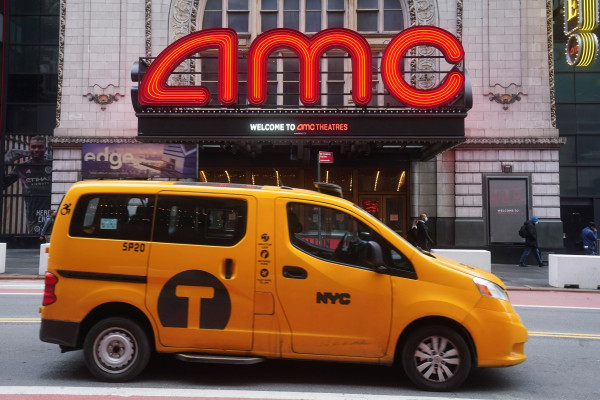Share sale takes puff out of AMC price after CEO popcorn pledge

(Reuters) -AMC Entertainment took advantage of a record stock price on Thursday with its second share issue in three days, while admitting it did not know how long its stellar show would last and warning investors of the risks involved.
The theater chain operator's chief executive Adam Aron had offered even the smallest shareholder a free large popcorn if they signed up to a regular newsletter, as retail punters helped AMC's share price to a record close of $62.55 on Wednesday.
However, AMC's price was down 8% on Thursday, after the company said had agreed to sell up to 11.55 million of its shares from time to time in an at-the-market program.
"Our current market prices reflect market and trading dynamics unrelated to our underlying business, or macro or industry fundamentals, and we do not know how long these dynamics will last," AMC said in a statement.
A number of Wall Street analysts have said AMC is already heavily overvalued and many institutional traders have said they were steering clear of the stock, the latest target of a pack of small-time traders organised on Reddit and other social media.
"Under the circumstances, we caution you against investing in our Class A common stock, unless you are prepared to incur the risk of losing all or a substantial portion of your investment," AMC said, echoing a warning from regulators earlier this year on the potential pitfalls of such stocks
Wednesday's record price was 30 times the level AMC traded at the end of 2020 and came a day after it issued 8.5 million shares to Mudrick Capital, which the hedge fund flipped at a profit..
Operating over 1,500 theatres across the world and with a market capitalisation of close to $30 billion, each AMC theatre could be worth nearly $20 million.
"You've got the company currently selling stocks through the rally because these prices are not going to last forever, so why not use this opportunity to shore up your balance sheet and raise some cash," Dennis Dick, a trader at Bright Trading LLC in Las Vegas, said.
AMC said in January it had secured almost $1 billion in new funding and cash since mid-December, and it has continued with further issues. The number of AMC shares in issue has hit nearly 500 million from just 100 million at the end of last year.
David Trainer, CEO of investment research firm New Constructs said that the rise of streaming and stiff competition facing movie theaters meant the U.S. economy's reopening is unlikely to boost AMC's performance.
MEME STOCKS
"AMC's business was trending in the wrong direction even prior to the Covid-19 pandemic...We think AMC's stock is worth $0 per share, given its weak earnings, dilution from recent stock offerings and mountain of debt."
AMC shares have continued to gain as they were hyped online with calls for small investors to buy shares and call options on certain "meme stocks".
Such investors care little about fundamentals and particularly target stocks with high short interest to force bearish investors to unwind their bets at a loss.
The breathtaking gains have hurt investors shorting AMC stock and they were scrambling to cover their positions. Short-sellers are estimated to have lost $2.75 billion on Wednesday alone, data from financial analytics firm Ortex shows.
AMC's bonds tell a very different story to its stocks.
While prices have recovered due to the company's renewed access to capital, they remain in troubled territory. For example, a $600 million 5.75% bond due 2025 was trading at 80 cents on the dollar on Thursday.
Of other big recent "meme" plays, BlackBerry Ltd's U.S. shares were up 25%, while GameStop Corp dipped 5% and Koss Corp shed 17%.
A short squeeze in GameStop in January triggered regulatory concern about the stability of brokers, with the National Securities Clearing Corp (NSCC) later applying to tighten rules on the deposits brokers are needed to post ahead of stock options expiry.
(Reporting by Sagarika Jaisinghani, Aaron Saldanha and Devik Jain in Bengaluru and Thyagaraju Adinarayan, Sujata Rao in London; Editing by Sriraj Kalluvila, Saumyadeb Chakrabarty, Patrick Graham and Alexander Smith)












